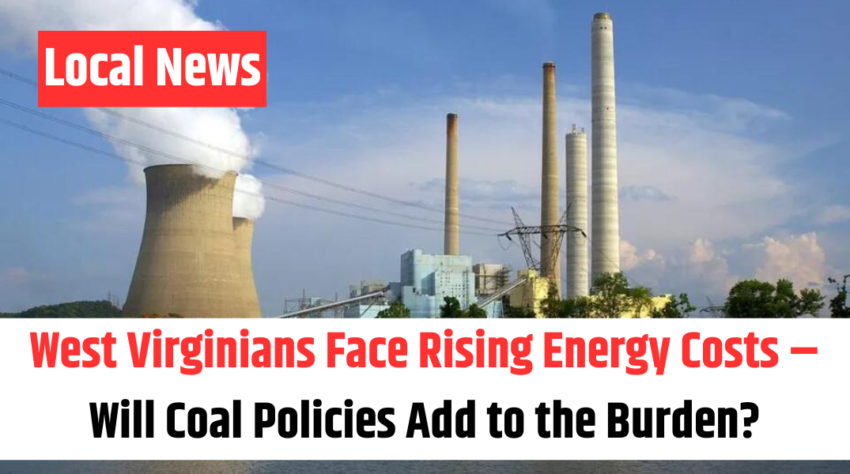William Worley, a Raleigh County resident, has been making changes to reduce his household’s energy consumption. He and his wife have replaced all their light bulbs with energy-efficient alternatives and turn off their HVAC system when the weather permits.
Despite their efforts, their electricity bill has skyrocketed. In January, the couple paid nearly $700, and by February, their bill had risen to $760. Traditionally, their monthly energy costs ranged from a few hundred dollars to around $350 during peak heating and cooling seasons. The sudden increase caught them off guard.
“We knew the winter weather was harsh, but we’ve lived here for over two decades, and we’ve never seen our bill climb this high,” Worley said.
Worley is not alone—households across West Virginia are struggling with soaring electricity costs. Lawmakers have acknowledged the issue but are advancing a policy that could make the problem even worse.
Proposed Legislation Fails to Address the Issue
A bill currently under consideration in the state legislature aims to regulate how energy companies ensure electricity reliability. If passed, it would require utilities to prove that any changes in energy production still meet peak demand before they can recover costs from consumers.
Critics argue that this measure could discourage investment in renewable energy sources like wind and solar, as utilities may struggle to recover those costs. Meanwhile, fossil fuel expenses, such as coal, would remain easier for power companies to recoup. The West Virginia Coal Association has backed the proposal, claiming it will encourage the continued operation of coal-fired power plants.
However, utility providers say that rising coal costs are the main factor driving up electricity prices.
“The primary factor in whether our plants run is the cost of the fuel we use,” said Randall Short, regulatory services director for Appalachian Power. “If coal is cheaper than other energy sources in the market, we operate the plants. When it’s more expensive, we don’t.”
Short also noted that since 2019, Appalachian Power customers’ bills have increased by nearly $50, with 60% of that rise due to higher fuel costs.
Also Read – Coyote Sightings on the Rise: What You Need to Know & Do
Coal’s Declining Competitiveness
For many years, West Virginia boasted some of the lowest electricity rates in the country due to its abundant coal resources. However, as alternative energy sources such as natural gas and renewables have become more affordable, coal has struggled to remain competitive.
Appalachian Power operates three coal-fired plants in the state, but there has been ongoing debate about their efficiency and cost-effectiveness. In 2021, the West Virginia Public Service Commission (PSC) instructed the company to run its plants 69% of the time despite concerns that doing so was not financially viable.
Just last week, the Sierra Club reached a settlement with the PSC, leading the agency to rescind that directive. While no longer a mandate, the PSC still considers this usage level a guideline for power providers.
Increased Costs and Uncertainty
Under the proposed legislation, the PSC would be responsible for ensuring compliance with the new rules. However, PSC Chair Charlotte Lane told lawmakers that the bill would have little effect on what the commission already does.
“This bill appears to have good intentions, but it’s difficult to determine its actual purpose,” Lane said in testimony on March 13. “It won’t change much except add more paperwork for our office.”
When asked if the legislation would require the PSC to take on new responsibilities, Lane responded, “No, aside from reviewing additional reports.”
Utility companies, however, warn that the bill could drive up costs for customers.
FirstEnergy subsidiaries Mon Power and Potomac Edison have stated that the measure would increase regulatory burdens and could result in even higher electricity rates.
“West Virginia’s current system already provides effective oversight through the PSC,” said FirstEnergy spokesperson Will Boye. “This bill would only complicate the process and make rate cases more costly for customers.”
Appalachian Power’s leadership echoed these concerns.
“The bill shifts how energy sources are evaluated, emphasizing factors beyond cost,” said company President Aaron Walker. “If this is the direction the legislature wants to take, we will comply, but it may lead to higher rates for our customers.”
Walker also warned that the legislation’s uncertainty could deter businesses from investing in West Virginia.
Meanwhile, in Raleigh County, Worley continues to find ways to cut back on energy usage as Appalachian Power pursues another rate hike.
“It feels like no matter what we do, we’re hit with another expense—power, groceries, and everything else,” he said.
